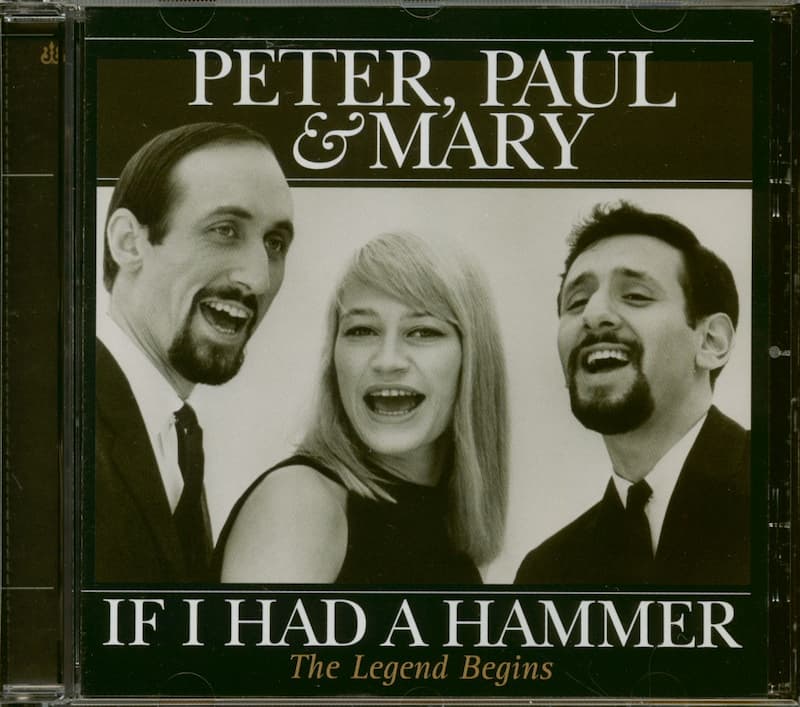
About The Song
“If I Had a Hammer (The Hammer Song)” was written in 1949 by Pete Seeger and Lee Hays, members of the folk group The Weavers, in support of the progressive movement. Initially performed at a testimonial dinner for the Communist Party USA leaders on trial, it was first recorded by The Weavers in 1950 for Hootenanny Records but saw limited release due to the group’s blacklisting during the McCarthy era. The song was published in 1958 in Sing Out! magazine. Peter, Paul and Mary’s version, arranged by the trio and produced by Albert Grossman and Milt Okun, was recorded in 1962 at Bell Sound Studios in New York City. It was released as a single in July 1962 by Warner Bros. Records, with “Lemon Tree” as the B-side, and included on their self-titled debut album, Peter, Paul and Mary, released in May 1962. The track, running 2:11, is a folk anthem emphasizing justice, freedom, and love.
The single entered the Billboard Hot 100 at position 85 on August 11, 1962, peaking at number 10 on September 22, 1962, for one week, and stayed on the chart for 11 weeks. It also reached number 3 on the Billboard Middle-Road Singles (Adult Contemporary) chart. Internationally, it hit number 4 in Canada on the CHUM Chart and number 15 in Australia. The song’s success helped establish Peter, Paul and Mary as leading folk artists. Cash Box described it as a “hard-driving, rhythmic folk item” with “infectious harmonies.” In 1963, the trio’s recording won two Grammy Awards: Best Folk Recording and Best Performance by a Vocal Group.
Background details include the song’s origins in the labor and civil rights movements. Seeger and Hays wrote it to symbolize tools of change—hammer for justice, bell for freedom, and song for love. Peter, Paul and Mary’s polished rendition broadened its appeal, making it a civil rights anthem. They performed it at the 1963 March on Washington, alongside Martin Luther King Jr.’s “I Have a Dream” speech, amplifying its reach. The song was covered by artists like Trini Lopez (1963, number 3 on the Hot 100), Sam Cooke (1964), and Aretha Franklin (1982). A 1964 parody by The Chad Mitchell Trio, titled “I Wasn’t Born to Follow,” was retitled after a legal threat from Seeger’s publishers.
Expert commentary includes AllMusic’s Bruce Eder, who called the trio’s version a “definitive interpretation” for its clarity and energy. Songfacts noted its role in galvanizing the folk revival, while American Songwriter emphasized its enduring protest spirit. No major controversies surrounded the trio’s recording, though The Weavers’ original faced scrutiny due to their political ties. The song’s simple structure—four verses with a repeating chorus—made it widely adaptable, appearing in media like the 1990 film Look Who’s Talking Too and a 2013 Glee episode. Its legacy includes induction into the Grammy Hall of Fame in 1998.
Video
Lyric
If I had a hammer
I’d hammer in the morning
I’d hammer in the evening
All over this land
I’d hammer out danger
I’d hammer out a warning
I’d hammer out love between my brothers and my sisters
All over this landIf I had a bell
I’d ring it in the morning
I’d ring it in the evening
All over this land
I’d ring out danger
I’d ring out a warning
I’d ring out love between my brothers and my sisters
All over this landIf I had a song
I’d sing it in the morning
I’d sing it in the evening
All over this land
I’d sing out danger
I’d sing out a warning
I’d sing out love between my brothers and my sisters
All over this landWell I’ve got a hammer
And I’ve got a bell
And I’ve got a song to sing
All over this land
It’s the hammer of justice
It’s the bell of freedom
It’s the song about love between my brothers and my sisters
All over this land